K
katokoch
Guest
With input from this previous thread, http://benchrest.com/forums/showthread.php?t=57349 , I finally got down to getting the design machined and finished. Well, it's not completely finished, but close enough.
The final product remains close to this initial design
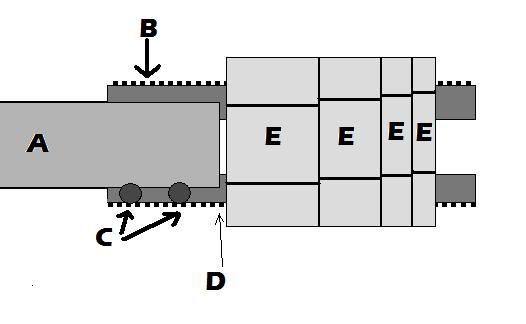
but with a couple changes.
Here's how it finished up.
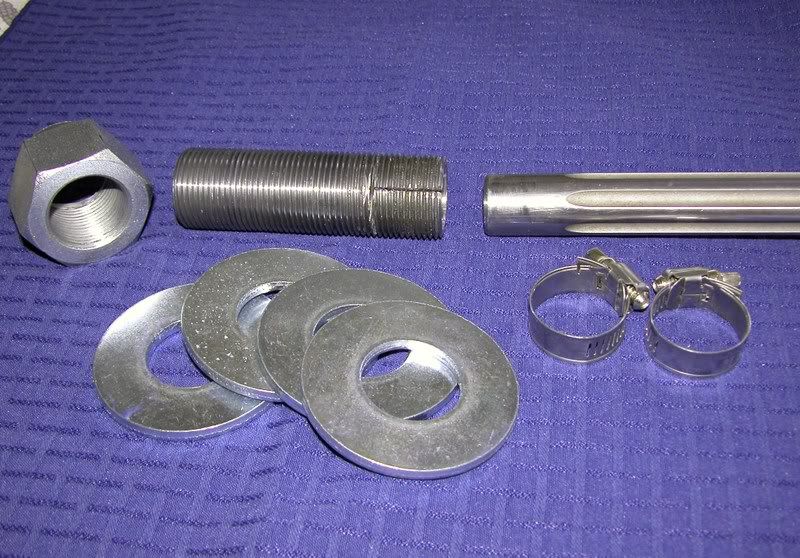
What you see there is a .920" cylinder barrel, a 4" long peice of 1 1/4" diameter fine threaded steel, a fine threaded 1 1/4" zinc-plated nut, four 1 1/4" I.D. steel washers, and a couple hose clamps. You may notice that the nut is one of the stupid "locking nut" types with a plastic insert, but to get it to easily move across the length of the tuner I simply ground out the plastic. to free up the ends of the threads.
Pretty simple. I decided that taking a couple 1 1/4" nuts and cutting them to different lengths (weights) would be a severe pain, so I decided on another way to adjust the weight. Washers. I plan on taking the single nut, weighing it to determine the density, and cutting it in two peices to have two peices that weight the same. If the situation arises where I need finer adjustment than one of the big washers, I can easily trim one down, or add stick-on lead weights to another. However, this won't happen for awhile because I have yet to finish a stock for this rifle and I am just having the bedding block machined now, so I can't safely determine whether or not the rifle will make 10.5 or 13.5 lbs. Obviously, if the rifle will be in the 13.5-lb. class (IR 50/50), I will have more weight to play with on the tuner.
Now, as far as attatching the tuner to the barrel, 1" of the rod is bored out to .925" so it is a tight slip fit over the barrel. I made two cuts in the .925" end of the tuner, one across and one down so I can slip the tuner over the muzzle and use a simple hose clamp to tighten it up. Believe me, when I get the hose clamp tight, the tuner isn't going anywhere. I have a second if one ends up not being enough. The rest of the tuner is bored out 3/4".
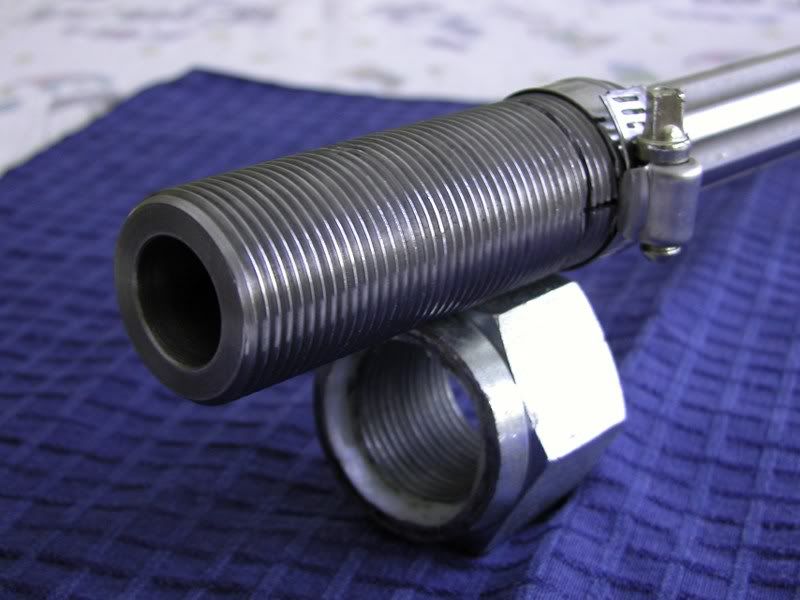
I may end up just using the large nut to adjust the tuner, as it has over 3" of room to slide around, like this.
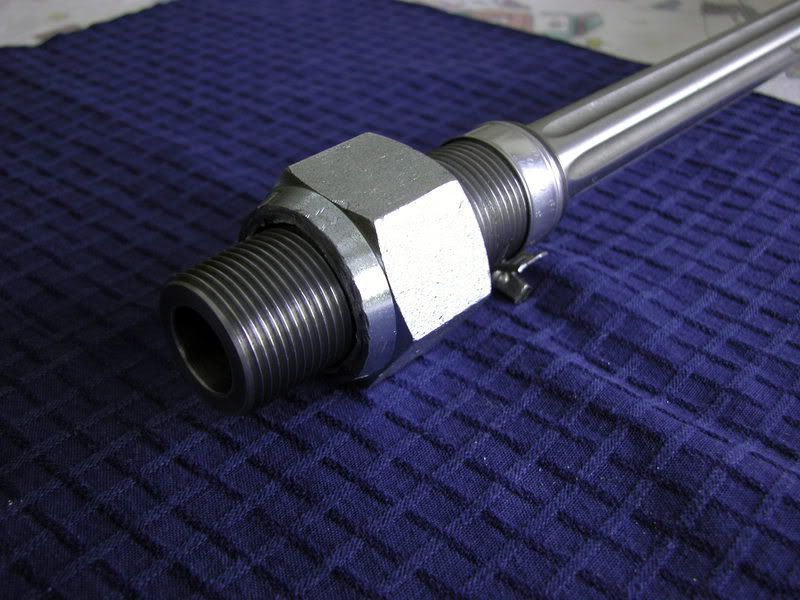
With maximum weight on the tuner (which is more than I see listed for any add-on weights for tuners), here it is.
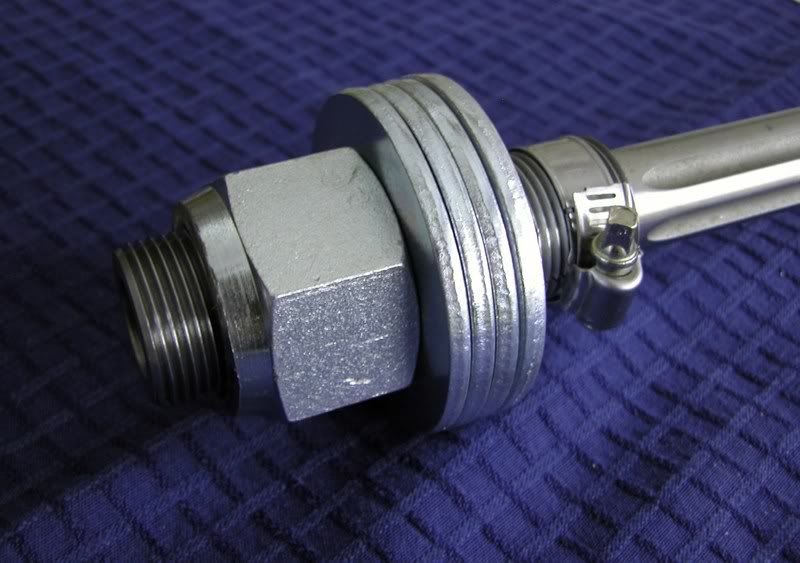
I highly doubt I'll ever need this much weight to stop the muzzle, but I will be prepared. I don't have anything precisely weighed, but I do know the barrel is .920" cylinder, 20" long and fluted, so it's not the heaviest by any means.
The best part (for me at least), is that everything cost me $42 total. $30 from the machine shop and $12 from a Fastenal down the road for the nut, washers, and clamps. I had to spend some of my time and elbow grease on the thing as far as cutting and fitting, but I'll ignore that. Yes, it's not elegant by any means, but it will hopefully work and that's what matters most.
I've found a couple indoor ranges in my area so I've got some work to do, figuring this thing out. I guess it's time I stop ignoring threads and posts about tuners and tuner adjustment.
The final product remains close to this initial design

but with a couple changes.
Here's how it finished up.

What you see there is a .920" cylinder barrel, a 4" long peice of 1 1/4" diameter fine threaded steel, a fine threaded 1 1/4" zinc-plated nut, four 1 1/4" I.D. steel washers, and a couple hose clamps. You may notice that the nut is one of the stupid "locking nut" types with a plastic insert, but to get it to easily move across the length of the tuner I simply ground out the plastic. to free up the ends of the threads.
Pretty simple. I decided that taking a couple 1 1/4" nuts and cutting them to different lengths (weights) would be a severe pain, so I decided on another way to adjust the weight. Washers. I plan on taking the single nut, weighing it to determine the density, and cutting it in two peices to have two peices that weight the same. If the situation arises where I need finer adjustment than one of the big washers, I can easily trim one down, or add stick-on lead weights to another. However, this won't happen for awhile because I have yet to finish a stock for this rifle and I am just having the bedding block machined now, so I can't safely determine whether or not the rifle will make 10.5 or 13.5 lbs. Obviously, if the rifle will be in the 13.5-lb. class (IR 50/50), I will have more weight to play with on the tuner.
Now, as far as attatching the tuner to the barrel, 1" of the rod is bored out to .925" so it is a tight slip fit over the barrel. I made two cuts in the .925" end of the tuner, one across and one down so I can slip the tuner over the muzzle and use a simple hose clamp to tighten it up. Believe me, when I get the hose clamp tight, the tuner isn't going anywhere. I have a second if one ends up not being enough. The rest of the tuner is bored out 3/4".

I may end up just using the large nut to adjust the tuner, as it has over 3" of room to slide around, like this.

With maximum weight on the tuner (which is more than I see listed for any add-on weights for tuners), here it is.

I highly doubt I'll ever need this much weight to stop the muzzle, but I will be prepared. I don't have anything precisely weighed, but I do know the barrel is .920" cylinder, 20" long and fluted, so it's not the heaviest by any means.
The best part (for me at least), is that everything cost me $42 total. $30 from the machine shop and $12 from a Fastenal down the road for the nut, washers, and clamps. I had to spend some of my time and elbow grease on the thing as far as cutting and fitting, but I'll ignore that. Yes, it's not elegant by any means, but it will hopefully work and that's what matters most.
I've found a couple indoor ranges in my area so I've got some work to do, figuring this thing out. I guess it's time I stop ignoring threads and posts about tuners and tuner adjustment.
Last edited by a moderator:

